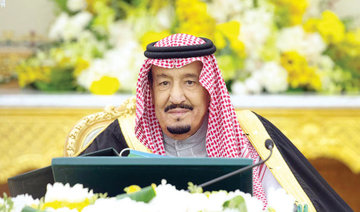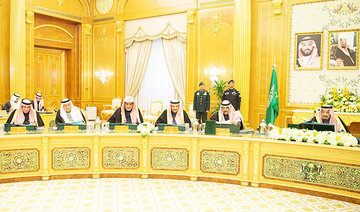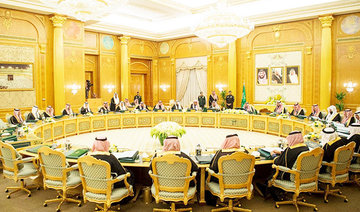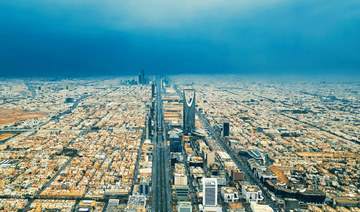RIYADH: The Saudi Cabinet has welcomed the response and commitment voiced by the Yemeni parties in Aden to a call by the Saudi-led Arab Coalition supporting legitimacy in Yemen for restraint and peace.
Chaired by King Salman at Al-Yamamah Palace on Tuesday, the Cabinet said the aim of the call is to ensure the security and stability of Yemen and to preserve regional and global security and peace.
The Cabinet said the call also aims to keep Yemen safe and capable of development and prosperity.
Also at the regional level, the Cabinet appreciated the resolution passed by the Arab League foreign ministers in Cairo on the US administration’s decision on Al-Quds.
On terrorism, the Cabinet expressed the Kingdom’s condemnation of the terror bombing inside the building of the tax department in Ankara, Turkey, and the Kingdom’s rejection of all forms of terrorism.
At the local level, the Cabinet appreciated the unlimited support from King Salman for the caring of camels which form part of the Kingdom’s heritage, his patronizing of the closing session of the King Abdul Aziz Camel Festival and for giving prizes to the winners of the King Abdul Aziz Camel Award.
The Cabinet also praised the king’s patronage of the 32nd Janadriyah Festival, scheduled to open Wednesday.
The Cabinet also authorized the ministers of finance and transport to discuss and sign draft agreements between the Kingdom and Switzerland, the UK and the US on tax and civil aviation.
Saudi Cabinet welcomes positive response of Yemeni parties to coalition call
Saudi Cabinet welcomes positive response of Yemeni parties to coalition call

Grand mufti of Saudi Arabia warns against Hajj without permit

- Call for pilgrims to strictly adhere to security and official instructions
RIYADH: The Grand Mufti of Saudi Arabia Sheikh Abdul Aziz bin Abdullah Al-Asheikh has called on all Hajj pilgrims to strictly adhere to security and official instructions by obtaining a Hajj permit and the vaccinations required by the Ministry of Health, the Saudi Press Agency reported on Friday.
The grand mufti, who is also the chairman of the Council of Senior Scholars and head of the General Presidency for Scholarly Research and Fatwa, said that pilgrims were not allowed to go to Hajj without a permit.
He said: “The wise leadership and the state have enacted regulations and instructions aimed at facilitating and arranging the reception of pilgrims, providing them with all means of comfort, and helping them to perform rituals with ease and reassurance.
“These services require adherence to them and care for them to ensure the safety of everyone, and other purposes.”
He added that the Kingdom’s government had spared no effort in achieving its lofty goals in the service of Islam and Muslims, the Two Holy Mosques and their visitors.
He said the Kingdom’s leadership and people were honored by serving the Two Holy Mosques, but that “this requires full compliance with all official instructions received regarding organizing the Hajj, including obtaining a permit and also obtaining vaccinations.”
He urged pilgrims to invest their time during the days of Hajj in devotion to God through supplication and worship, and called on them to adhere to controls and procedures to ensure their safety and security.
How Saudi Arabia is building a sustainable agricultural sector through innovation

- A vertical farm in Riyadh has produced a greater yield of strawberries than local farmers at a fraction of the water usage
- Wadi Bin Hashbal, the Kingdom’s Guinness World Record-breaking sustainable farm, uses treated water to irrigate its crops
RIYADH: Climate change poses a significant threat to agriculture, with serious implications for food security, livelihoods and access to water. That is why Saudi Arabia is adopting a range of innovative and sustainable farming practices.
As summer temperatures become more intense around the world, crop yields are dwindling and water scarcity mounting, raising the specter of food insecurity in some regions and higher prices on domestic and global markets.
Agriculture is also a major contributor to greenhouse gas emissions. About 24 percent of human-induced emissions are the result of agriculture, forestry and land use activities, according to the Intergovernmental Panel on Climate Change.
To limit the environmental harm caused by farming while also adapting crop production to hotter, drier conditions, governments and businesses worldwide are adopting new technologies, methods and practices in pursuit of sustainable agriculture.
According to the Food and Agriculture Organization of the UN, strategies for agriculture and forestry, unlike in other sectors, can simultaneously increase adaptive capacity and mitigate climate change if implemented sustainably.

Sustainable agriculture refers to methods and practices that preserve the environment, protect natural resources, ensure the security of food supply chains and provide sufficient returns for farmers.
Saudi Arabia has established several sustainable agriculture initiatives, including efforts to promote the use of treated water for irrigation and the adoption of soilless farming techniques — measures designed to meet the needs of a changing demographic.
By 2045, the world’s urban population is projected to increase by 1.5 times to 6 billion, according to the World Bank. With many more people leaving rural areas in search of opportunities in the cities, the way food is produced and distributed requires a rethink.
That is why Saudi Arabia is exploring the use of urban farming technology, including vertical farming or soilless culture, as a potential solution.

Vertical or soilless farming refers to a method of growing plants without the use of soil, whereby nutrients are delivered to the roots through water — a process also known as hydroponics.
Soilless plants utilize drip or mist irrigation techniques, enabling a more controlled dispensation of water, preventing water wastage. This technique saves 98 percent more water than traditional farming, according to the World Economic Forum.
Areas struggling with water scarcity, poor soil fertility, salinity, or sodicity could benefit from this method, not only to conserve water and reduce pesticide usage, but also to allow for year-round crop production.
The National Research and Development Center for Sustainable Agriculture, or Estidamah, is a standalone legal not-for-profit research center based in Saudi Arabia. Its vertical farming program aims to optimize crop production — mainly leafy vegetables and strawberries.
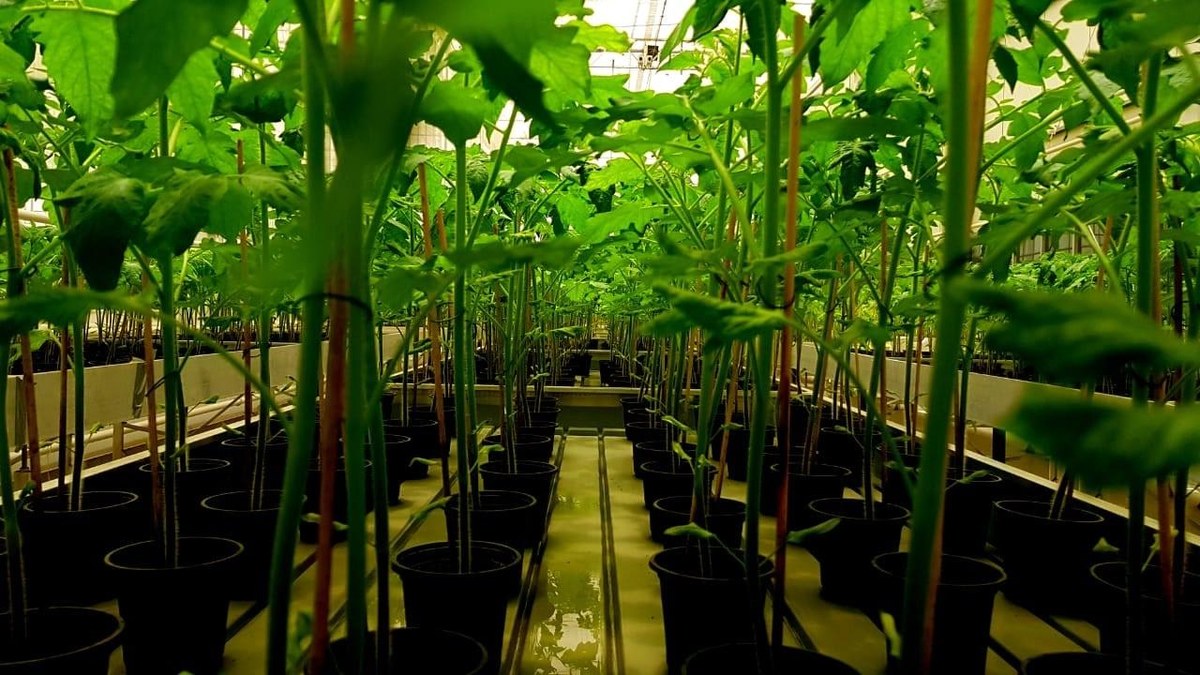
To bolster this initiative, the Ministry of Environment, Water, and Agriculture set aside SR100 million ($27 million). In 2021, scientists from Estidamah and Wageningen University in The Netherlands managed to cultivate Estavana variety strawberries in a greenhouse in Riyadh.
The resulting strawberry yield, and that of two other varieties, was considerably greater than that of local farmers, demonstrating the technology’s immense potential.
However, Saudi Arabia’s commitment to sustainable agriculture is perhaps best demonstrated by the methods and practices used at Wadi Bin Hashbal — a mega farm situated in the mountainous southwestern Asir region.
“This farm is the largest sustainable research demonstration or experimental farm in the world, with an area exceeding 3.2 million square meters, as is recognized by the Guinness World Records,” Ahmed Al-Mujthal, director-general of the Ministry of Environment and Water’s Asir branch, told Arab News.
One of the most impressive features of the farm is its use of treated water to irrigate crops. “The treated water is divided into municipal and industrial wastewater, with each type requiring specific treatment plants,” said Al-Mujthal.
DID YOUKNOW?
• Saudi Arabia exports wheat, dates, dairy products, eggs, fish, poultry, fruits, vegetables and even flowers.
• Wadi bin Hashbal’s sustainable farm is recognized by Guinness World Records as the largest in the world using treated water to irrigate crops.
• Urban farming and treating wastewater for irrigation are some of the sustainable agricultural practices adopted by Saudi Arabia.
The primary treatment phase removes large particles and oils, the secondary treatment phase involves aerobic bacteria, and the tertiary treatment uses filters to remove remaining pollutants and odors.
“Chlorination is done to eliminate microbes and treated water is suitable for all uses except direct human consumption,” said Al-Mujthal. “The amount of water produced from the treatment plants in the Asir region exceeds 240,000 cubic meters per day.”
The treated water is then transported across the region to where it is needed. “There are four main treated water plants in the Asir region, all of which rely on the triple treatment method and are completely suitable for irrigating all crops,” Al-Mujthal added.
Wadi Bin Hashbal has about 16,000 trees yielding eight varieties of seasonal fruit, in addition to 2,400 non-fruiting local trees and a field designated for growing fodder and raising livestock. It also contains five protected, air-conditioned farms designated for research.

“More importantly is monitoring the quality of water and soil that is carried out on the farm by constantly taking samples and analyzing them in specialized laboratories accredited by the ministry,” said Al-Mujthal.
This is in addition to measuring the temperature and humidity in the soil, and the amount of rain and wind speed on the site through the climate station established on the farm.
The Asir region was strategically chosen for the farm as it is characterized by a unique geography, the fertility of its soil and its favorable climate.
“In general, the data received from the competent authorities indicates that the average rainfall in the Asir region exceeds 300 mm per year,” said Al-Mujthal. In mountainous areas with dense vegetation, rainfall can even exceed 500 mm per year.
“Other factors include the relative abundance of surface and groundwater in addition to the presence of excellent infrastructure in the Asir region for drainage and water treatment,” Al-Mujthal added.
The success of the Kingdom’s sustainable agriculture projects bodes well for climate-vulnerable nations around the globe that are struggling to adapt to water scarcity and rising temperatures.
Indeed, if crops can be grown sustainably in Saudi Arabia — one of the hottest and driest places on the planet — there is hope yet for agriculture in a changing world.

Saudi defense ministry completes Hajj preparations

RIYADH: The Ministry of Defense says it has completed its preparations for this year’s Hajj season and is ready to support the work of the nation’s security services and government agencies in serving pilgrims, the Saudi Press Agency reported on Friday.
A supervisory committee, headed by the director of the Joint Staff of the Armed Forces, has been set up and is responsible for preparing, planning and supervising all of the tasks assigned to the ministry’s units.
The ministry will support the Ministry of Interior in implementing plans to prevent any incidents that disrupt the security of Hajj and pilgrims, by supervising the courtyards of the Holy Mosque in Makkah, managing the airspace of the holy sites and monitoring the flow and movement of crowds to and from the holy sites.
The ministry has prepared a number of hospitals and emergency centers to support the Ministry of Health and will also host a number of its employees, children of Saudi and Yemeni martyrs and pilgrims from more than 20 countries.
Pilgrims and other guests at its camps have been given scientific and guidance lectures from scholars and sheikhs.
Imams and khatibs of the Two Holy Mosques to shorten prayers and Friday sermons during 2024 Hajj season

- The decision comes in light of the millions of pilgrims visiting the holy sites
- Al-Sudais said Muslims seek guidance from the contents of sermons
RIYADH: Imams and khatibs of the Two Holy Mosques have been directed to shorten the Friday sermons and prayers for the remaining Fridays during the Hajj season in consideration of the circumstances of severe heat pilgrims face this year.
Sheikh Abdulrahman Al-Sudais, head of the Presidency of Religious Affairs at the Grand Mosque and the Prophet’s Mosque said the decision comes in light of the millions of pilgrims visiting the holy sites and the intense heat experienced in Makkah and Madinah.
The directive aims to facilitate and ensure the safety of worshippers in the Mataf, roof, and courtyards of the mosques. Al-Sudais explained that the decision is based on Islamic principles and the observed objectives of alleviating difficulties for those attending Friday prayers during the Hajj season.
Al-Sudais said Muslims seek guidance from the contents of sermons but noted that lengthy preaching might cause worshippers to forget the beginning by the end, underlining the importance of concize and impactful messages.
He had previously instructed the imams to reduce the amount of recitation and the gap between the Adhan and Iqamah during the Hajj season to ease the burden on worshippers, particularly considering overcrowding and the presence of vulnerable and elderly people.
Saudi films hit the big screen at leading Australian locations

- Sydney Opera House to feature in Film Commission’s ‘Saudi Film Night’ offering
RIYADH: Saudi films will be screened at two of Australia’s premier venues, the Sydney Opera House and the five-star Sofitel Melbourne on Collins, this month as part of a partnership aimed at fostering collaboration between the film industries in both countries.
The “Saudi Film Night” screenings from June 26-28 have been organized by the Kingdom’s Film Commission and Australian production company Blacksand Pictures, the Saudi Press Agency reported.
Two separate screenings each will comprise two films: “Hajjan” by director Abu Bakr Shawky, screened alongside the short film “Me & Aydarous” by director Sara Balghonaim, and the comedy-drama “Alhamour H.A.” by director Abdulelah Alqurashi, shown with animated stop-motion short “Saleeg” from director Afnan Bawyan.
According to SPA, each screening will be followed by a question-and-answer session with visiting Saudi film representatives. Local film industry professionals will attend both events.
The screenings reflect the commission’s commitment to promoting the Kingdom’s film culture and highlighting Saudi films on an international stage.
“We are also fostering collaboration between international film communities, including the Australian film industry, to exchange expertise and knowledge,” said Saudi Film Commission CEO Abdullah bin Nasser Al-Qahtani.
Two of Australia's leading film producers, Alan Finney and Jane Jeffes, selected the Saudi offerings, said Kauthar Abdulalim, founder of Blacksand Pictures.
The event reflects the Saudi Film Commission’s dedication to fostering global partnerships and leveraging cultural exchange as a cornerstone of Saudi Arabia’s Vision 2030, SPA said.


